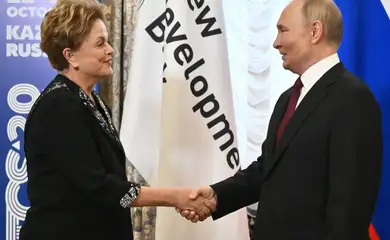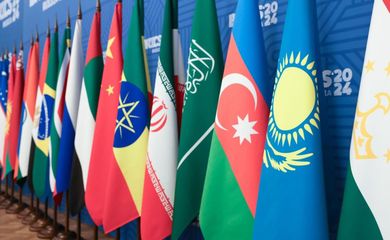BRICS: Lula argues for alternate means of trade exchange

Brazilian President Luiz Inácio Lula da Silva on Wednesday (Oct. 23) once again defended the creation of alternate means of payment for commercial transactions between the BRICS countries, a bloc of developing countries of which Brazil is a member. The president took part in the 16th BRICS Leaders’ Summit in Kazan, Russia, through video from Brasília.

In President Lula’s view, the measure should reduce vulnerabilities facing these nations and the asymmetries in the international financial system. “It’s not about replacing our currencies, but we need to work to ensure that the multipolar order we are aiming for is reflected in the international financial system. This discussion needs to be tackled with seriousness, caution, and technical solidity, but it can no longer be postponed,” he stated.
President Lula also addressed themes that have recurred in his speeches at international forums—such as the fight against climate change and hunger, the wars in the Middle East and Eastern Europe, taxing the super-rich, and the democratization of multilateral frameworks.
This is the first BRICS summit attended by the five new members that joined the bloc this year: Egypt, Iran, the United Arab Emirates, Saudi Arabia, and Ethiopia. Until last year, BRICS was made up only of Brazil, Russia, India, China, and South Africa.
The summit
Among the issues discussed at the Kazan summit were negotiations to reduce dependence on the dollar in trade between the bloc’s countries, as well as measures to strengthen alternative financial institutions to the International Monetary Fund (IMF) and the World Bank, which are mainly controlled by Western powers.
In his speech, President Lula mentioned the creation of the Interbank Cooperation Mechanism, through which the bloc’s national development banks can establish credit lines in local currencies, “which will reduce transaction costs for small and medium-sized businesses.” He also highlighted the work of the New Development Bank (NDB), the BRICS bank headed by former Brazilian President Dilma Rousseff.
“[The NDB], which turns 10 this year, has been investing in the infrastructure needed to strengthen our economies and promote a just and sovereign transition,” he said, citing the bank’s portfolio of almost 100 projects and loans adding up to 33 billion dollars.
“It was designed to succeed where the Bretton Woods institutions continue to fail. Instead of offering programs that impose conditions, the NDB finances projects aligned with national priorities. Instead of deepening disparities, its governance is based on equal voting rights,” he added.
Bretton Woods is the US city where the conference that created the IMF and the World Bank was held after the Second World War, with the aim of drawing up rules for the international monetary system.
He also discussed the economic and commercial potential and high social mobility of the BRICS nations and how the bloc’s initiatives aim to break away from the rationale of concentrating investment in developed countries. “We represent 36 percent of the global GDP by purchasing power parity. We have 72 percent of the planet’s rare earths, 75 percent of its manganese, and 50 percent of its graphite. However, financial flows continue to go to rich nations,” he noted.
“The work of the Business Council has helped expand trade between us. Brazilian exports to the BRICS countries grew 12-fold between 2003 and 2023. The BRICS is now the source of almost a third of Brazil’s imports. The Women’s Business Alliance is creating networks to foster women’s economic empowerment and combat persistent gender inequalities,” he pointed out.
Brics in Brazil
In 2025, Brazil is expected to take over the presidency of the BRICS and President Lula reaffirmed the need to modernize the institutions of global governance and democratize access to technologies. The Brazilian government, he said, plans to “reaffirm the bloc’s vocation in the fight for a multipolar world and for less asymmetrical relations between countries.”
“We can’t accept the imposition of apartheids in access to vaccines and medicines, as happened in the pandemic, nor in the development of artificial intelligence, which is heading towards becoming the privilege of a few. We need to strengthen our technological capabilities and favor the adoption of non-exclusive multilateral frameworks, in which the voice of governments prevails over private interests,” said the Brazilian leader.
He criticized the ongoing wars in the world and repeated what Turkish President Recep Tayyip Erdogan said at the United Nations General Assembly in September this year, that the Gaza Strip has become “the largest cemetery of children and women in the world.”
“This senselessness is now spreading to the West Bank and Lebanon. Avoiding escalation and starting peace negotiations is also crucial in the conflict between Ukraine and Russia,” said the Brazilian president at the event chaired by Russian President Vladimir Putin.
“At a time when we are facing two wars that have the potential to become global, it is essential to recover our ability to work together towards common goals. That’s why the motto of the Brazilian presidency will be ‘Strengthening Cooperation in the Global South for More Inclusive and Sustainable Governance,’” he declared.
Common agendas
In his speech, President Lula also thanked the BRICS members for their support for Brazil’s presidency of the G20 in 2024 and for the issues that Brazil defends aiming to reduce inequalities in the world, such as taxing the super-rich and fighting hunger.
“Our countries have implemented successful social policies in recent decades that can serve as an example to the rest of the world,” he said, inviting the countries to join the Global Alliance Against Hunger and Poverty, which will be officially unveiled at the G20 Leaders’ Summit, a bloc of the world’s 19 largest economies, the European Union, and the African Union. The meeting will take place in Rio de Janeiro in November, when Brazil’s presidency comes to an end.
The president also mentioned the fight against climate change and once again called for greater commitment from rich countries in financing prevention and mitigation measures. In his opinion, however, it is also up to emerging countries to “do their part” to curb the rise in global temperatures. “The scientific data express an unprecedented sense of urgency. We only have one planet, and its future depends on collective action,” he warned.
“The BRICS is a key player in tackling climate change. There is no doubt that the greatest responsibility lies with the rich countries, whose history of emissions has culminated in the climate crisis that afflicts us today. We need to go beyond the $100 billion a year that has been pledged but not met, and strengthen measures to monitor the commitments made,” said the president, speaking about the 2025 United Nations climate summit (COP30), which will be held in Belém.





